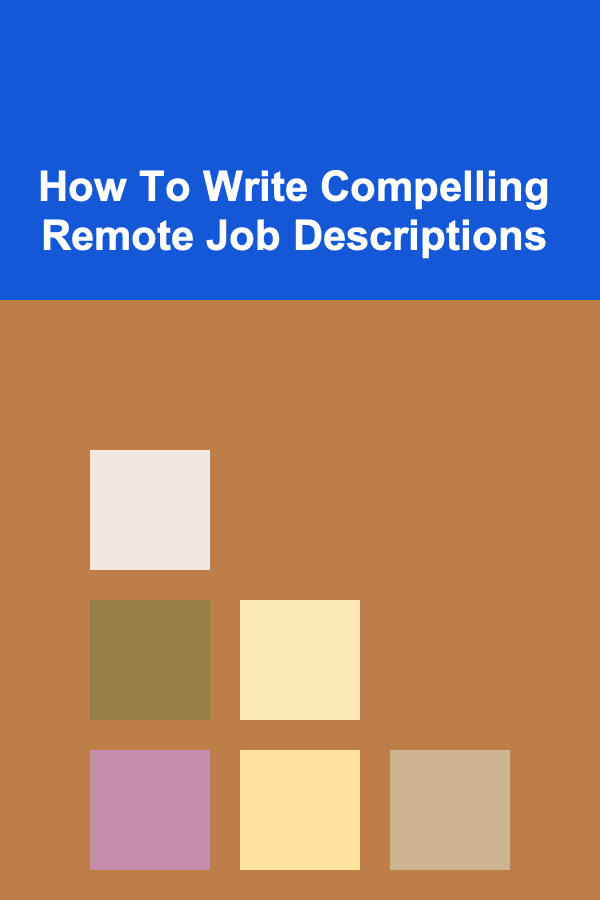
How To Write Compelling Remote Job Descriptions
ebook include PDF & Audio bundle (Micro Guide)
$12.99$9.99
Limited Time Offer! Order within the next:

In today's digital world, the concept of remote work has transitioned from a temporary solution to a permanent and highly sought-after work arrangement. With the rise of remote work, companies are realizing that a well-crafted job description can help attract the right talent. However, writing an effective remote job description requires more than just listing the qualifications and responsibilities. It must be compelling, engaging, and communicate the unique benefits of working remotely. In this article, we will explore how to write a compelling remote job description that will not only attract top talent but also align with your company's values and culture.
Why Remote Job Descriptions Matter
Remote work offers flexibility, but it also introduces a new set of challenges for companies and candidates alike. A remote job description is often the first point of contact between a potential employee and an organization. It sets expectations, clarifies roles, and helps applicants understand if the position aligns with their skills and lifestyle. A poorly written job description can create confusion and discourage top talent from applying.
A compelling job description serves several critical functions:
- Attracting the right candidates: It paints an accurate picture of the role and the work environment.
- Setting clear expectations: It outlines responsibilities and requirements, so candidates know what is expected of them.
- Promoting company culture: A well-crafted job description communicates the company's values and work ethos.
- Building trust: Transparency in job descriptions fosters a sense of trust between the employer and potential employees.
Key Elements of a Compelling Remote Job Description
Writing a job description for a remote position is similar to writing one for an in-office role, but with a few key differences. In remote job descriptions, you must highlight elements that are unique to remote work and address any concerns or questions applicants may have about working remotely.
Here are the key elements to include in a remote job description:
1. Job Title and Summary
The job title should be clear, concise, and specific to the role. It should reflect the nature of the job and align with industry standards. For example, instead of simply writing "Manager," use "Remote Marketing Manager" or "Virtual Project Manager" to specify that the role is remote.
The job summary, or introduction, should serve as a brief overview of the role. This is your opportunity to grab the candidate's attention by emphasizing the unique aspects of the role and remote work benefits. It should communicate why the position is exciting and why candidates would want to apply.
For example:
- Remote Marketing Manager: "We're looking for a creative and data-driven marketing manager to lead our team remotely. As a key player in our digital marketing strategy, you'll have the flexibility to work from anywhere while making a real impact on the growth of our business."
2. Job Responsibilities
Remote job responsibilities should be clearly defined and transparent. This section should outline the specific duties the employee will be responsible for on a daily or weekly basis. Be realistic and include both routine tasks and long-term goals. It's important to also highlight any tasks that are unique to remote work, such as managing virtual teams, utilizing collaboration tools, or organizing remote meetings.
Examples of remote job responsibilities might include:
- Collaborate with cross-functional teams in a fully virtual environment.
- Use project management tools like Asana or Trello to track progress and ensure deadlines are met.
- Organize and lead virtual meetings and presentations.
- Provide regular reports on project milestones and key metrics.
3. Skills and Qualifications
In this section, list the specific skills and qualifications required for the role. Remote work often demands a specific set of competencies, such as excellent communication skills, the ability to manage time effectively, and proficiency with various digital tools.
Be sure to differentiate between "must-have" and "nice-to-have" skills. This will prevent you from discouraging potential candidates who might not meet every single requirement but are still highly qualified for the role.
For example:
-
Must-Have Skills:
- Strong written and verbal communication skills.
- Experience with remote collaboration tools (e.g., Slack, Zoom, Google Suite).
- Ability to manage multiple tasks and prioritize effectively.
-
Nice-to-Have Skills:
- Experience with content management systems (CMS) such as WordPress or Squarespace.
- Basic knowledge of SEO and digital marketing.
4. Remote Work Specific Requirements
Clearly outline the requirements for remote work. This section is crucial, as candidates will want to understand the expectations for remote work before applying. You should address practical elements such as working hours, availability, and communication expectations.
Be specific about:
- Whether the role is fully remote or if there is a hybrid component.
- The time zone expectations (for example, if employees need to be available during certain hours).
- Whether the role is location-specific or if applicants can work from anywhere.
- If there is any required travel for the role (e.g., occasional team meetups or client visits).
For example:
- "This is a fully remote position. You must be available to work from 9 AM to 5 PM EST. Occasional travel to team-building retreats will be required."
5. Company Culture and Values
Since remote employees may not have the same level of day-to-day interaction with their colleagues, it's essential to convey your company culture and values clearly in the job description. Highlight what makes your company unique and how remote employees contribute to your mission. Remote work can sometimes feel isolating, so making it clear that your organization values communication, collaboration, and work-life balance is crucial.
For example:
- "At [Company Name], we believe in the power of collaboration, even in a remote environment. Our team is passionate about supporting one another and providing growth opportunities to all employees. We prioritize work-life balance, flexible hours, and open communication."
6. Benefits and Perks of Remote Work
Remote work offers unique advantages, and it's important to emphasize these in your job description. Some benefits to highlight might include:
- Work-life balance: Emphasize how remote work enables employees to better manage their personal lives and professional responsibilities.
- Flexible hours: Showcase how remote employees can set their own work hours, promoting autonomy and personal productivity.
- Reduced commuting time: Remote positions eliminate the need for commuting, allowing employees to reclaim valuable time.
- Remote work stipends: Many companies offer stipends for remote employees to purchase home office equipment or cover internet costs.
For example:
- "Enjoy the flexibility of working from anywhere and managing your own schedule. Our company offers a monthly home office stipend to help cover any costs associated with your remote work setup."
7. Application Process and Expectations
Be transparent about the hiring process and timeline. Candidates want to know what to expect after they apply, so clearly outline the steps involved, including interviews, assessments, and expected response times. Additionally, mention if there are any specific documents or work samples that applicants should submit as part of their application.
For example:
- "To apply, please submit your resume along with a cover letter explaining why you're a great fit for the role. If selected, you'll be invited for a virtual interview, followed by a skills assessment."
Tips for Writing a Compelling Remote Job Description
1. Use Clear and Inclusive Language
Avoid jargon or overly complex language. A compelling remote job description should be easy to read and understand. Use inclusive language that appeals to a wide range of applicants and avoids bias.
2. Focus on the Benefits
Remote candidates are often looking for more than just a paycheck. Highlighting the unique benefits of working remotely, such as flexibility, autonomy, and improved work-life balance, can make your job description stand out.
3. Keep It Concise
While it's important to be thorough, you don't want your job description to be overwhelming. Stick to the essential details and avoid lengthy paragraphs. Use bullet points and clear subheadings to make the information easy to digest.
4. Emphasize Growth Opportunities
Remote candidates want to feel that they're working for a company that supports personal and professional growth. Make sure to mention any opportunities for career advancement, skill development, or internal promotions.
5. Test and Revise
After writing your job description, test it out. Share it with current employees or trusted colleagues to get feedback. Revise it based on their input to ensure it's as compelling and clear as possible.
Conclusion
Writing a compelling remote job description is key to attracting the best candidates for your company. By focusing on clear communication, transparency, and the unique benefits of remote work, you can create job listings that resonate with potential applicants. Remember that the goal is to set the right expectations and present your company as a place where talented individuals can thrive remotely. Whether you are hiring for a technical, creative, or customer-facing role, following these best practices will help you attract top talent in the competitive remote job market.

How to Create a Realistic Home Budget That Works
Read More
How to Establish a Nightly Routine for Morning Success
Read More
How to Make Money Online as an Accommodation Reviewer: 10 Actionable Ideas
Read More
How To Understand the Basic Steps of Wine Tasting
Read More
How To Style Cargo Pants for Everyday Wear
Read More
How to Create a Sewing Project Checklist for Beginners
Read MoreOther Products

How to Create a Realistic Home Budget That Works
Read More
How to Establish a Nightly Routine for Morning Success
Read More
How to Make Money Online as an Accommodation Reviewer: 10 Actionable Ideas
Read More
How To Understand the Basic Steps of Wine Tasting
Read More
How To Style Cargo Pants for Everyday Wear
Read More